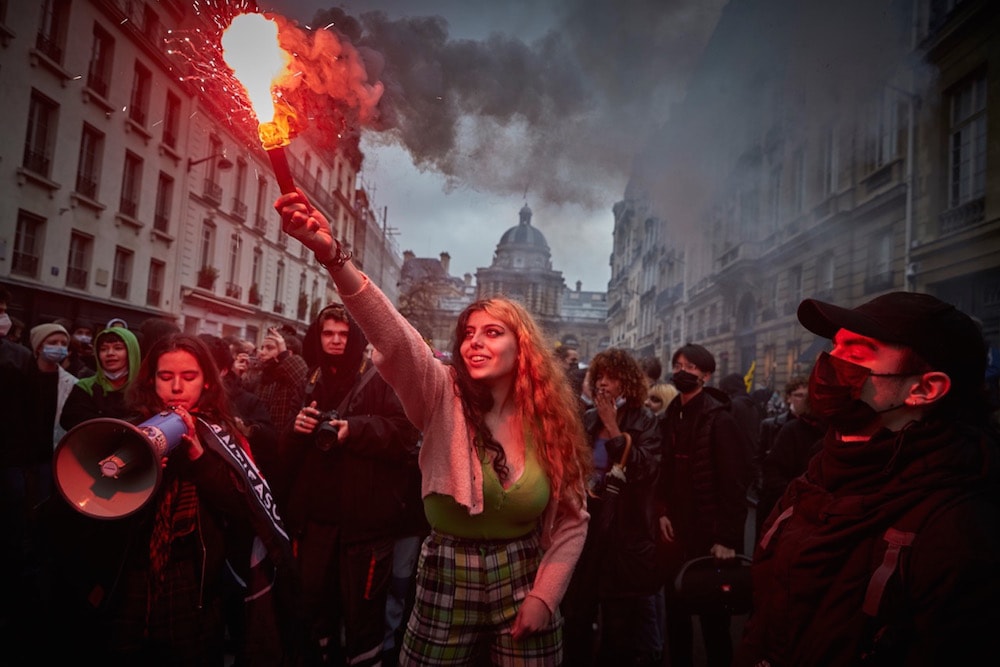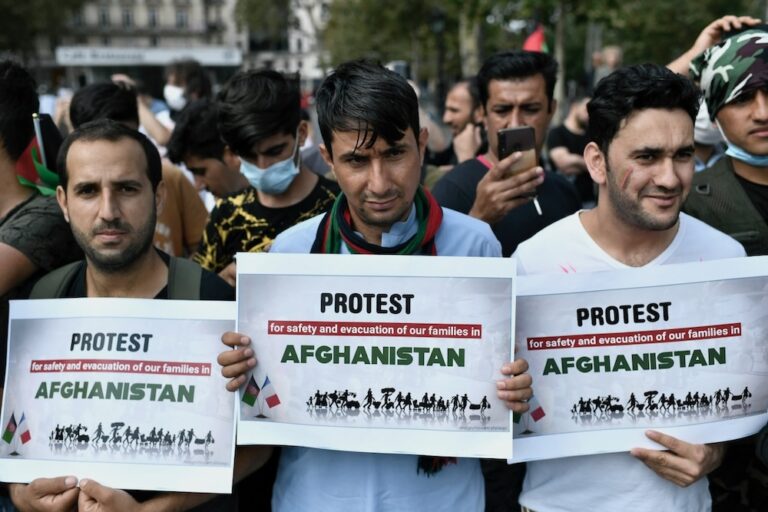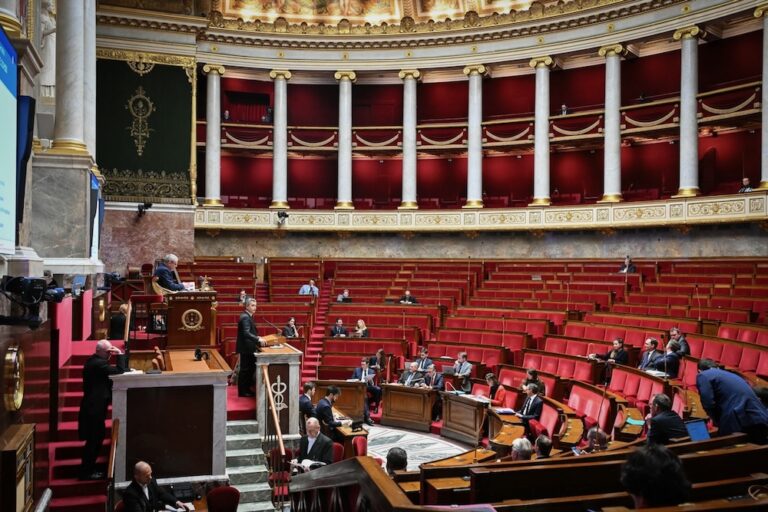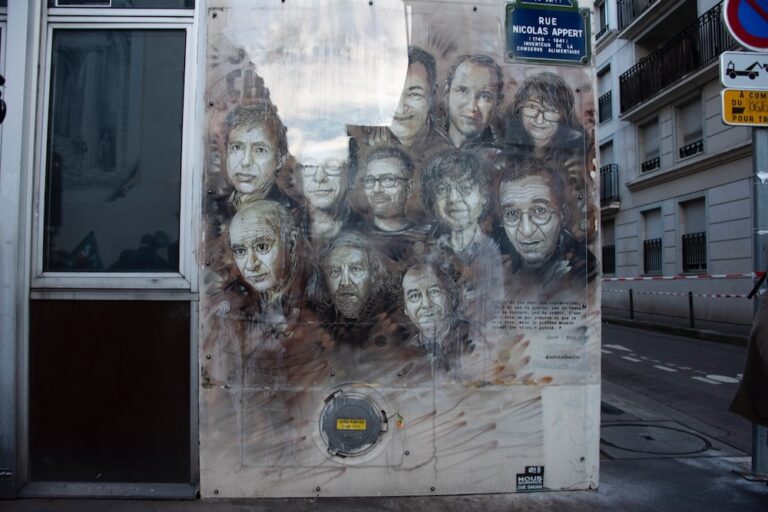"ARTICLE 19 is concerned about a series of draft laws and decisions in France that significantly impede the exercise of freedom of expression and access to information. These include the Global Security Bill, the dissolution of certain non-governmental organisations, and the Bill to strengthen “respect for republican principles.”
This statement was originally published on article19.org on 12 March 2021.
ARTICLE 19 is concerned about a series of draft laws and decisions in France that significantly impede the exercise of freedom of expression and access to information. These include the Global Security Bill, the dissolution of certain collectives and non-governmental organisations, as well as the Bill to strengthen “respect for republican principles.” ARTICLE 19 calls for Article 24 of the Global Security Bill to be withdrawn, alongside similar proposals in the draft law on respect for republican values. We also urge that any decision to close a charity should only be taken exceptionally following a court order in order to ensure compliance with international human rights standards.
France is currently going through a period of virulent political debate, particularly since the beheading of Professor Samuel Paty for sharing caricatures of the Prophet Mohammed with his students during a course on freedom of expression in October 2020. The government has responded to this attack with the Global Security Bill, the Bill to strengthen “respect for republican principles” and the decision to dissolve certain collectives and NGOs. The government says that these measures are necessary to enhance unity and end religious separatism in the country.
However, France must respect the right to freedom of expression set out in the International Covenant on Civil and Political Rights (ICCPR). Any restriction on freedom of expression must (1) be provided for by law; (2) pursue one of the legitimate aims set out exhaustively in Article 19 (3) of the International Covenant on Civil and Political Rights (ICCPR) or Article 10 (2) of the European Convention on Human Rights; and (3) be necessary and proportionate to that aim. All legislation must respect these principles. ARTICLE 19 is concerned that these legislative proposals and decisions to dissolve various organisations and collectives could adversely affect freedom of expression in France.
The Global Security Bill
On 24 November 2020, the National Assembly voted for the Bill “for global security”. Between 16 and 18 March, the Senate will publicly debate the proposed amendments to the Bill made by the Senate’s Committee on legal affairs on 3 March. At the outset, ARTICLE 19 is concerned that the government is using a fast-track procedure to adopt this Bill, which is deeply inimical to a range of fundamental rights, including the rights to freedom of expression and privacy. This is especially so given the absence of urgency that would justify such a procedure.
Article 24 and the protection of the police
One of the most concerning provisions of the proposed law is Article 24, whose stated purpose is to “protect those who protect us.” In the version adopted by the National Assembly in November 2020, Article 24 would make it an offence punishable by one year imprisonment and a fine of 45,000 euros to disseminate, by any means whatsoever, images of the police in the course of a police operation that would enable their identification when it is done “for the manifest purpose of interfering with the physical or mental integrity” of police forces. This would be ‘without prejudice to the right to impart information”.
The terms used in this provision are extremely vague. No details are given as to how capturing an image and disseminating it could harm the physical or mental integrity of the police. There is no further clarification on how intent must manifest itself for this new offence to be constituted. A vague intention to harm is enough without any need to prove actual harm. As it stands, this provision could be used to prevent citizens from criticizing police action or to suppress any evidence of police violence.
The police are a public service. The exercise of the police function must therefore be transparent. Protecting the physical or mental integrity of law enforcement agencies cannot be used as a cover for impunity for actions committed in the context of police operations. Notwithstanding the reference to the right to information, ARTICLE 19 is particularly concerned about the repercussions this article may have on the activity of activists who document police actions at demonstrations or other public gatherings. Moreover, as our research shows (for more information, see the Annex to this statement)1 there is no equivalent provision in other countries, such as Germany, Ireland, the Netherlands or Canada (Quebec).
On 3 March 2021, the Law Commission of the Senate proposed its own version of Article 24. Article 24 now comprises two offences:
- A new offence of “provoking identification”, which sanctions “the provocation, with clear intent to undermine their physical or psychological integrity, to identify” law enforcement “that are carrying out a police operation”. This offense is punishable by five years imprisonment and a 70 000 euro fine. The sanctions provided are applicable when the provocation also concerns the partner or child of a member of police forces.
- The second offence punishes the act of processing personal data relating to officials or persons in charge of a public service because of their function outside of the purposes provided by the GDPR and data protection act (loi informatique et liberté). This offense is punishable by five years imprisonment and a 300 000 euro fine.
The new version is unfathomable. “Provoking identification” is a new concept, to say the least. Yet, there is no definition or explanation as to what these terms mean. ARTICLE 19 is worried that the scope of this version could be extended to “other elements of identification that are not images but could still be shared with the same malicious intent and intention to cause harm”. The aim of the new version suggests that it would include “malicious comments under published images”. This is particularly alarming because the new version is punishable by five years imprisonment and a 75 000 euro fine. These new amendments are not only vague but also carry disproportionate sanctions. Moreover, the creation of such an offence is not necessary as Article 24 of the 29 July 1881 law on the freedom of the press already sanctions incitement to commit violent acts against anyone, including law enforcement.
In our view, the second offence is also disproportionate as it applies heavy criminal sanctions to a data protection regime that is originally civil or administrative in nature. In this regard, it is concerning that this new offence does not make any reference to intent and does not seem to consider that errors as to the purpose of data processing can happen. The idea of giving particular protection to data processing of public services officials does not appear to be justified either. In summary, this new version is overly vague, open to abuse with disproportionate sanctions.
We therefore ask for the outright removal of this article in its various forms as it constitutes a serious attack on rights and freedoms.
Facial recognition and mass surveillance
Before the private debates held on 3 March 2021, the senators suggested to put in place “a legal framework for the use of facial recognition in terrorist investigations”. To this end, the linking of two different databases would be authorised: the automated fingerprint file and the wanted persons file would then be linked to a video protection system. Moreover, the use of facial recognition looked to be extended beyond the fight against terrorism through another amendment already signed by 19 senators.
Ultimately, the committee of Legal Affairs of the Senate rejected these amendments. ARTICLE 19 reiterates that biometric mass surveillance in public spaces is not compatible with international human rights standards and does not comply with the legitimacy, necessity and proportionality test provided by Article 19 of the ICCPR. It normalises a culture of suspicion where individuals are no longer treated as citizens but as suspects in a way that is entirely unjustified. In addition to violating individuals’ right to privacy and anonymity, it has a strong chilling effect on people’s right to freely express themselves in public spaces and to take part in the public life of a democratic society. Studies carried out at the European level show that the awareness of being watched and tracked might lead people not to join public assemblies, or not to participate in social and cultural life, and not to freely express their thoughts, conscience and religious beliefs in public spaces.
ARTICLE 19 is particularly disappointed that an amendment proposing a two-year moratorium to ban “public authorities from deploying any automated system able to collect the image of a person by means of video protection for the purpose of biometric exploitation, in public spaces, without the consent of the persons concerned” was also rejected.
Once again, we call for the amendments on facial recognition to be withdrawn and ask that the entire Bill be assessed for its compliance with international human rights standards.
Law on “separatism”
The Bill on “strengthening respect for republican principles” was presented to the Council of Ministers on 9 December 2020. It marks the French President’s intention to fight against “Islamism and Muslim separatism” and seeks to punish behaviour considered “contrary to the values of the Republic.” The Bill was adopted after its first reading by the National Assembly on 16 February 2021. The Senate will begin examining the Bill on 30 March.
According to the government, the main provisions of the Bill aim to “fight against online hatred,” protect and further secularise public services, as well as establish obligations for transparency in the exercise of worship. It includes an “offence of endangering the life of another person by disseminating information relating to the private, family or professional life of a person that makes it possible to identify or locate them.” Similar to Article 24 of the Global Security Bill, this article is simply a second version of Article 24 if the latter is not adopted.
In general, this Bill follows a repressive logic. The French Defenseur des droits has said that it is an instrument that “reinforces global control of the social order”. It contains several measures that are deeply inimical to freedom of expression and freedom of association. Apart from concerns similar to Article 24 of the Global Security Bill, ARTICLE 19 is concerned that NGOs in France will find themselves more closely supervised in their operations, particularly their requests for subsidies, especially from abroad. Article 8 of the Bill will also provide for more extensive grounds for dissolution of NGOs (see explanatory notes). The government seems indifferent to the stigmatising impact of those measures on Muslim communities and their potentially discriminatory impact. We therefore invite the Senate to ensure that the provisions in the Bill respect human rights, in line with the recommendations of the Defenseur des droits.
The administrative dissolution of associations and organisations in France
Freedom of association is a constitutional principle inspired by the law of 1901. The dissolution of an association requires a decree issued by the Council of Ministers. The grounds are exhaustively listed in Article L212-1 of the internal security code. Associations may only be dissolved if they “provoke discrimination, hatred or violence against a person or group of persons on the grounds of their origin or their belonging or non-belonging to a given ethnic group, nation, race or religion, or propagate ideas or theories tending to justify or encourage such discrimination, hatred or violence”.
Civil society organisations and associations are important vehicles for the exercise of freedom of expression and access to information. Civil society holds the government to account and, in doing so, contributes to democracy. A diverse, inclusive, and active civil society is essential to confront current problems in France. Indeed, democracy rests on the freedom of each person to express their ideas and opinions.
The CCIF [Collectif contre l’islamophobie en France] was an organisation whose aim was to fight against discrimination towards Muslims in France and to support victims of islamophobia. In November 2020, the Interior Minister Darmanin announced his intention to dissolve the CCIF for spreading “Islamist propaganda.”, following the death of Samuel Paty. He claimed that the organisation was an “Islamist office against the Republic” and accused them of promoting “Islam values above those of the Republic”. These claims were rejected by the CCIF, notably in their final statement before dissolution. However, the CCIF notified the Interior Minister that their Board of Directors had pronounced the voluntary dissolution of the CCIF on October 29. Their assets have been transferred to partner associations and other activities abroad. Other charities have been dissolved recently, including the far-right group Generation Identitaire.
ARTICLE 19 has several concerns in relation to the decision-making process leading to the dissolution of NGOs. First, Article L212-1 uses vague terms that do not sufficiently protect NGOs against abusive dissolution. In particular, the article does not define what it means by the dissemination of ideas that have a “tendency to justify or encourage discrimination, hatred or violence”. These terms must be more clearly and precisely defined in order to prevent a large interpretation and misuse of the article.
Second, we note that the dissolution of a non-governmental organisation is an extremely serious matter that should be taken only exceptionally following a court order. A decision of such magnitude, taken without prior judicial authorisation, seriously undermines the exercise of freedom of expression and association. It may act as a deterrent to other organisations fighting discrimination and ‘hate speech’ in France.
The French government must ensure that such decisions are always accompanied by a procedure before a judge to guarantee the right to freedom of expression and association.
Next Steps
All of these decisions reflect disturbing steps toward increasingly strict limitations on freedom of expression in France against a background of political discourse that appears to attack academic freedom. As a country that prides itself to be a “country of human rights and les Lumières”, it is vital for France to respect its international human rights obligations, not only in internal affairs, but also as an example to the world.
ARTICLE 19 recommends that France reassesses the measures taken to ensure that they are compatible with international human rights law. Restricting the exercise of these fundamental rights does not allow for an open, informed and inclusive discussion on these important topics. As the 2022 election campaign draws near, President Macron’s government should demonstrate that it respects and protects human rights, instead of adopting measures that risk aggravating current social and cultural tensions.



